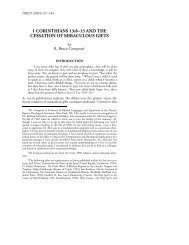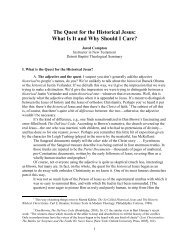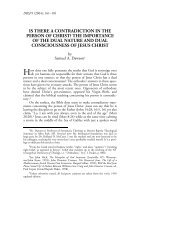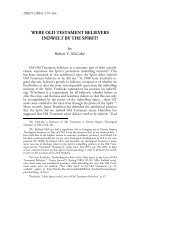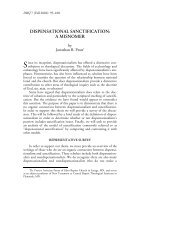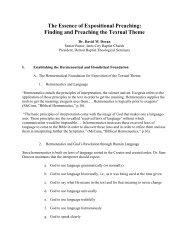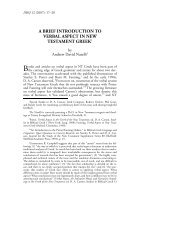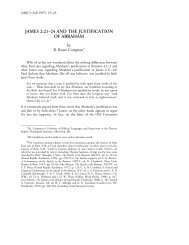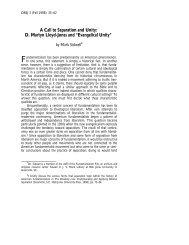Combs, Role of Women in the Church - Detroit Baptist Theological ...
Combs, Role of Women in the Church - Detroit Baptist Theological ...
Combs, Role of Women in the Church - Detroit Baptist Theological ...
Create successful ePaper yourself
Turn your PDF publications into a flip-book with our unique Google optimized e-Paper software.
9“source” and “authority over” for kephalē and <strong>in</strong>stead proposes (though not strongly)that, along with Cerv<strong>in</strong> and Perriman, <strong>the</strong> gloss “preem<strong>in</strong>ent” or “foremost” bestcaptures Paul’s thought. 54I. F<strong>in</strong>ally, <strong>in</strong> 2001 Grudem produced ano<strong>the</strong>r long article designed to address <strong>the</strong> latestattempts to overthrow <strong>the</strong> traditional understand<strong>in</strong>g <strong>of</strong> “authority over” for kephalē. 55The bulk <strong>of</strong> <strong>the</strong> article is a detailed rebuttal <strong>of</strong> Kroeger’s essay <strong>in</strong> <strong>the</strong> Dictionary <strong>of</strong> Pauland His Letters. Grudem basically accuses here <strong>of</strong> academic misconduct <strong>in</strong> that shemakes claims that are patently false. For <strong>in</strong>stance, she cites a quotation from Chrysostomthat does not actually exist. In o<strong>the</strong>r cases she cites sources to prove that kephalē means“source” that do not actually use <strong>the</strong> word kephalē. Grudem concludes that Kroeger’sattempt to prove that kephalē means “source” is an utter failure. In relation to <strong>the</strong> view<strong>of</strong> Perriman and Thiselton (and Cerv<strong>in</strong>), Grudem repeats his challenge that no lexiconhas ever suggested that kephalē should be translated “prom<strong>in</strong>ent,” “preem<strong>in</strong>ent” or“foremost.” In fact, <strong>the</strong> idea <strong>of</strong> “preem<strong>in</strong>ent” would seem to create more problems thanit solves s<strong>in</strong>ce it imports <strong>the</strong> idea <strong>of</strong> male superiority <strong>in</strong>to <strong>the</strong> text (e.g., “<strong>the</strong> man ispreem<strong>in</strong>ent over <strong>the</strong> woman”). 56 On <strong>the</strong> o<strong>the</strong>r hand, no one would deny that <strong>the</strong> personwho is “head” is “prom<strong>in</strong>ent” <strong>in</strong> some sense.J. Given that hundreds, even thousands, <strong>of</strong> pages that have been written on <strong>the</strong> issue, it isdifficult, if not impossible, for me to covey <strong>the</strong> true force <strong>of</strong> <strong>the</strong> arguments withoutactually look<strong>in</strong>g at all <strong>the</strong> examples <strong>of</strong> <strong>the</strong> usage <strong>of</strong> kephalē <strong>in</strong>dividually. The previousrecital <strong>of</strong> <strong>the</strong> arguments back and forth may leave one with <strong>the</strong> impression that nodef<strong>in</strong>itive conclusion can be drawn s<strong>in</strong>ce so many scholars disagree. However, it appearsto me that Grudem has conv<strong>in</strong>c<strong>in</strong>gly proven his case that kephalē is clearly used <strong>in</strong>ancient Greek literature with <strong>the</strong> figurative sense <strong>of</strong> “authority over.” As far as I candeterm<strong>in</strong>e, kephalē is found <strong>in</strong> numerous contexts where it refers to people who haveauthority over o<strong>the</strong>rs <strong>of</strong> whom <strong>the</strong>y are <strong>the</strong> “head.” No one has yet has given an examplewhere one person is called <strong>the</strong> kephalē <strong>of</strong> ano<strong>the</strong>r person and that person is not <strong>the</strong> one<strong>in</strong> authority over that o<strong>the</strong>r person. Although a number <strong>of</strong> examples are cited to provethat kephalē means “source,” it does not appear to ever have such a mean<strong>in</strong>g withoutalso convey<strong>in</strong>g a sense <strong>of</strong> authority.IV. Kephalē <strong>in</strong> 1 Cor<strong>in</strong>thians 11:3A. In chapters 11–14 Paul deals with problems <strong>in</strong> <strong>the</strong> Cor<strong>in</strong>thian church related to publicworship. The first <strong>in</strong> 11:2–16 is concerned with a woman’s head cover<strong>in</strong>g when pray<strong>in</strong>gand prophesy<strong>in</strong>g. 57 Paul beg<strong>in</strong>s <strong>in</strong> v. 2 with a statement <strong>of</strong> praise for <strong>the</strong> Cor<strong>in</strong>thians:Commentary (Grand Rapids: Eerdmans, 2000).54 Ibid., pp. 812–22.55 Wayne Grudem, “The Mean<strong>in</strong>g <strong>of</strong> Κεφαλή “Head”): An Evaluation <strong>of</strong> New Evidence, Real andAlleged,” Journal <strong>of</strong> <strong>the</strong> Evangelical <strong>Theological</strong> Society 44 (March 2001): 25–65. This article was updated <strong>in</strong> 2002(to <strong>in</strong>teract with Thiselton’s commentary) as chapter 5 <strong>in</strong> Wayne Grudem, ed., Biblical Foundation for Manhoodand Womanhood (Wheaton, IL: Crossway, 2002). Page references are from <strong>the</strong> latter edition.56 Ibid., p. 196.57 The chapter division <strong>in</strong> our English Bibles at chapter 11 is unfortunate s<strong>in</strong>ce it is now generally agreedthat chapter 11:1 goes with chapter 10.



